We, at Barr and Attuned Education Partners, believe that meaningful, systemic change within schools is deepened and bolstered by the support of central office leaders.
Since 2016, Barr’s Education program has supported extensive work directly with high schools to plan, design, and implement a transformed high school experience. Though research clearly points to teacher and school leader practice as key levers of student outcomes, we’ve become increasingly convinced that in most contexts, teachers and leaders thrive when central office supports enable them to. Based on the lessons of this work we have increasingly embraced the reality that schools, particularly those in traditional district settings, exist in the context of their district and in relation with their central office. As a result, Barr and Attuned have partnered over the last five years to deepen support to districts through systems-level strategic support and coaching.
Our organizations have observed that central offices are rarely neutral – the way they operate either actively enables or stifles equity and growth within schools; often simultaneously in different ways. We believe it is possible and necessary for a district to transform its schools in meaningful ways that results in drastic shifts in the school experiences and ultimately more equitable outcomes for students. System-level leadership has the potential to enable, support, and sustain school-level transformation.
Seeking to better understand how system-level leaders in different contexts shepherded coherent change in their schools, Barr and Attuned partnered to advance our collective learning. Our hope is that the key findings affirm work in school systems that is already underway, as well as inspire reflection on leadership competencies, priorities, and systems to more meaningfully support schools to implement equitable and excellent experiences that result in strong outcomes for all students.
Attuned interviewed Superintendents and Chief Academic Officers from four districts with different contexts – but all with notable growth in student outcomes – including Ector County ISD in Texas, Indianapolis Public Schools in Indiana, School District of University City in Missouri, and Lincoln Parish in Louisiana. There were three overarching patterns across the four districts that were common indicators of the leaders’ ability to foster change in their schools. Each of the district leaders:
- Prioritizeeffectiveinstructional and staff capacity building: All of the districts interviewed include strategic priorities focused on effective teaching anchored in high-quality instructional materials and developing talent with the skills, mindsets, and content knowledge to operate effectively at different levels in the system.
- Commit to a multi-year strategic plan and are adept at leading a sustained change management effort: Each leader revealed a steadfast and enduring commitment to and ownership of their multi-year strategic plan. Moreover, these leaders are humble and compelling storytellers who continuously invest stakeholders in change efforts.
- Take steps each year to create ever-greater internal coherence in support of a focused set of strategic priorities: All of the districts in the study re-examined and clarified school autonomy. To create coherence, they realign resources (financial and human capital) to support the execution of the plan. Finally, each system establishes rigorous progress monitoring structures that allow them to manage priority initiatives.
The case studies included in the report System-Level Conditions that Enable, Support & Sustain School Transformation detail how these three evergreen practices emerged in each leaders’ work and influenced their district-specific choices. These case studies align with our own experiences in illustrating the critical role central office leaders can have in catalyzing transformation.
We invite school and district leaders, school committee members, policy makers, and technical assistance providers who coach and support schools and districts to read the report and join us for a virtual webinar to unpack findings on Tuesday, February 4th from 3:30-4:45pm. This participatory workshop will provide opportunities to:
- Hear more about the key learnings from the case studies
- Share and discuss your own meaning-making of the report in small groups
- Gather new ideas to use in your own leadership
During the session we’ll hone in on five important areas of reflection that highlighted at the end of the report:
- In what ways have you prioritized instructional effectiveness and capacity building? Are there opportunities to more emphatically foreground these bodies of work?
- How are you distilling the core of your strategic plan and priorities into messaging that is clear, concise, and compelling? How might you deepen that practice?
- What is your plan to repeat the narrative of the “why” so many times that every Cabinet member and principals could recite it back to you?What rituals do you currently have in place and what can you build to anchor your team in the strategic plan?
- How clear are your principals and their managers on what is non-negotiable and where they may exercise discretion?What systems do you have and what can you put in place to check for understanding?
- In what ways are your central office supports tightly aligned with strategic plan priorities? How might you more tightly align your central office supports to the key priorities in the strategic plan?
To register for the workshop, click here! We are eager to engage in conversation with those interested in developing their district’s instructional leadership, coherence, and progress. Ultimately, we believe these leaders play a pivotal role in systemic change in our schools in order for them to become learning environments worthy of our young people.





